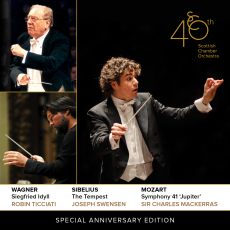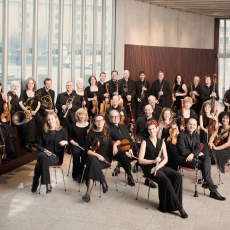Scottish Chamber Orchestra - 40th Anniversary Edition - Audiophile Audition
This assemblage of performances, 2003-2013, celebrates the Scottish Chamber Orchestra, the youngest of the Scotland-based ensembles of major significance. Robin Ticciati, the most recent of its Principal Conductors, leads a luminous rendition of Wagner's bitter-sweet A Siegfried Idyll (1870) from Usher Hall, Edinburgh from 3 September 2013. Along with the resonant glow of the SCO strings, we have rounded phrasing from French horns Alec Frank-Gemmil and Harry Johnstone. Oboe Robin Williams contributes his own luster to the mix, assisted by extremely hearty playing in the violas, cellos, and basses. Echoes of the "Forest Murmurs" from Siegfried blend with the so-called "steps music" to form a seamless tapestry of bucolic heroism, ardent and intelligently lit.
Joseph Swenson holds the post of Conductor Emeritus of the Scottish Chamber Orchestra. He elicits a bold transparency - rec. 24 March 2003 at Usher Hall - for the music of Jean Sibelius, the composer's Second Suite of nine movements from The Tempest (1927), atmospheric music that calls early upon the talents of the SCO harp and tympani. Generally, the Suite No. 2 proves more intimate than the 1925 First Suite, capturing the airy delicacy of characters Ariel, Miranda, and island Nymphs. The "Dance of the Nymphs" enjoys a special delicate inspiration. A broad melody defines "Prospero," the magician who stands for Shakespeare's late merger of artistic allegory and dramatic truth.
Sir Charles Mackerras (1925-2010), an eminent Mozart interpreter, leads a noble processional account of that composer's epic Jupiter Symphony from City Halls, Glasgow, UK, 6 August 2007. The SCO string section has become uncannily alert, even in the midst of the pomp and ceremony of the trumpets and drums. But the capacity for profound intimacy remains, especially in the muted, veiled violins that color the amazing Andante cantabile. Mackerras reigns as a master of Mozart's tricky agogics and sonic balances, and the result in the first movement produces a grand, mysterious sound that often harkens to Don Giovanni. The Menuetto: Allegretto throbs with the passion of an incipient sturm und drang, each repetition of the main melody's gaining increased power and sonority, especially from the tympani and brass. The colossal nobility of spirit - as much Mackerras' as Mozart's - spills ineluctably into the Molto allegro and its transcendent polyphony. The marvelous dynamic range of Mozart's expression, its lofty suddenness, its intrusion of singular instruments and their ensuing combinations, proffer a cornucopia of effects, all of which testify to a the wondrous depths a true humanity can command. If this recording were to serve as Sir Charles Mackerras' swan-song, it would long reveal and certify the purity of his musical mission.




